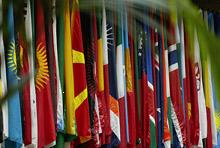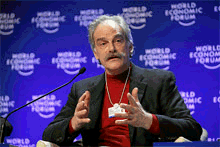
Typical street scene in Santa Ana, El Salvador. (Photo: iStock)
IMF Survey: As Contingency, IMF Aims to Double its Lendable Resources
February 2, 2009
- In precautionary move, IMF aims to double resources to $500 billion
- IMF has adequate funding to deal with current stage of economic crisis
- Plans aim to boost confidence that IMF can meet further demands
The IMF aims to double the amount of money it has available to lend to governments to $500 billion to strengthen international confidence that it can meet any new challenges during the current global downturn, in case more countries are forced to turn to the 185-member institution to borrow, the deputy head of the IMF said.

Lipsky: "We think it is prudent at this time to add contingent facilities that would double the resources available" to the IMF (IMF photo)
WORLD ECONOMIC CRISIS
"Right now the IMF has adequate resources to respond to the demands that we see in front of us immediately," IMF First Deputy Managing Director John Lipsky said during a panel discussion at the World Economic Forum in Davos on January 31.
"However, we think it is prudent at this time, to add contingent facilities that would double the resources available to us. We have, through quotas and existing borrowing agreements, $250 billion in total. We thought it prudent to add another $250 billion at this time." The IMF Executive Board is expected to consider a number of suggestions for boosting the IMF's resources shortly.
Worst in 60 years
In its latest assessment published on January 28, the IMF says that world growth is forecast to fall to its lowest level since World War II, with financial markets remaining under stress and the global economy taking a sharp turn for the worse, sending both global output and trade plummeting.
The IMF has so far committed $47.9 billion in lending to a number of economies affected by the crisis, including Belarus, Hungary, Iceland, Latvia, Pakistan, Serbia, and Ukraine. It announced a precautionary loan for El Salvador last month and an IMF team is also in negotiations with Turkey. Other countries may need financing in due course.
Offer from Japan
Japan has offered to lend the IMF $100 billion. Lipsky said the IMF aimed to raise an additional $150 billion. "I want to make clear that this is contingent facilities to give confidence that we have the resources to respond if needed."
He did not specify what other countries may provide the additional resources, although Lipsky did mention in an interview with the Wall Street Journal that the IMF could consider issuing bonds.

Lipsky: "Right now the IMF has adequate resources to respond to the demands that we see in front of us immediately" (photo: World Economic Forum)
Capital flows to emerging markets have slumped in recent months, leaving those with large current account deficits vulnerable.
"The IMF wants to make its finances bullet proof so that it can lend to any emerging economies that experience a sudden withdrawal of funds," the Financial Times said.
"Modest" proposal
Speaking during the same panel discussion at Davos, Montek Singh Ahluwalia, the Deputy Chairman of India's Planning Commission and a former head of the IMF's watchdog known as the Independent Evaluation Office, said an extra $250 billion was a "very modest" proposal given the amount of resources being deployed in some advanced economies to counter the crisis.
He suggested two alternatives to tapping a few countries for the $250 billion in extra funding.
• A tripling of the IMF's quotas—capital provided by member countries
• A generalized issue of the IMF's Special Drawing Rights (SDRs), which supplement the existing official reserves of member countries.
Foreseeing recovery
Lipsky said that with adequate policy response by governments, including fiscal stimulus in advanced economies and some emerging markets, the world could see a revival of economic growth toward the end of 2009 "and a return over the next year to trend growth. But decisive action will be needed."
In other points, Lipsky said that
• A restoration of the health of the financial system was a precondition for economic recovery
• Governments must not fall into the "seductive trap" of focusing only on national priorities at the expense of international health
• The fall in oil prices and continued domestic spending by oil exporters would be an important source of support for the global economy
Reforming the IMF
Both Ahluwalia and—during a separate discussion—South Africa's Finance Minister Trevor Manuel said that, in addition to extra capital, the IMF needed reforming to improve representation of emerging markets and other developing countries. European countries, for example, should not have so many seats on the Executive Board, said Manuel, who is chairing a committee on IMF governance reform that is expected to report in April.
Reform of the IMF should be a critical part of the agenda for the Group of Twenty (G-20) industrialized and emerging market leaders who will meet in London on April 2, said Ahluwalia.
"I'm very clear that we need an IMF, but what we're doing is taking the IMF we invented in 1945 and putting Band-Aid on all kinds of bits and pieces. You need to go back a little bit to the drawing board. And that is what the G-20 ought to be focusing on," he said.
Comments on this article should be sent to imfsurvey@imf.org







